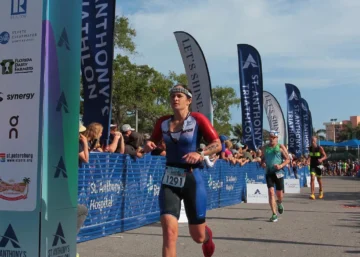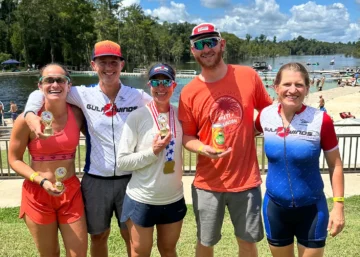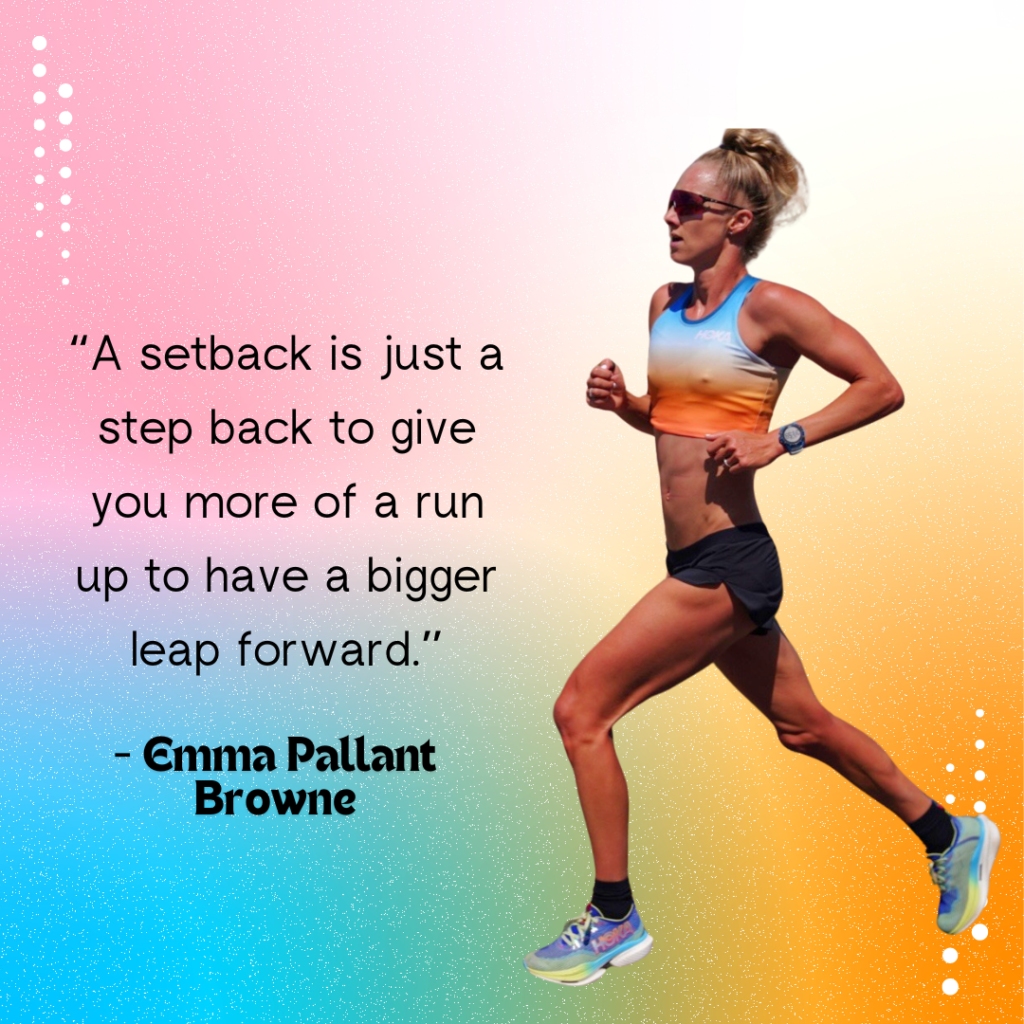
I recently interviewed professional triathlete, Emma Pallant-Browne, for an article in Triathlete Magazine. The topic was How to Overcome an Early-Season Setback.
I couldn’t think of a better person to shed light on this topic considering how her race season began… First, there was the hospitalization at T100 Miami. Then, she had a bike crash before 70.3 Oceanside. During the race, she took a wrong turn on the bike course she had to correct. Then, she was initially DQ’d for a speed zone infraction that was later overturned to put her back on the podium.
I wanted to learn her secret to staying positive in the face of such adversity.
She offers up no excuses and isn’t angry or bitter when bad things happen. She has a healthy perspective on personal growth, overcoming obstacles, and most importantly, perspective about what matters most in life.
During our interview, she said something that really resonated with me. “A setback is just a step back to give you more of a run up to have a bigger leap forward.”
I mean, if you need to hear something motivational today it really doesn’t get any better than that!
But make no mistake, it’s not all sunshine and roses. Within the article, she talks about the frustration, disappointment, and overwhelming guilt she experienced after the race in Miami.
Following this string of unfortunate events, that makes her win, and course record, at 70.3 Mallorca on Saturday even more impressive!
So I asked Emma to come on the blog to talk about some of the struggles she faces as a pro triathlete. We talk about how she uses happiness as fuel for racing and how she has a go-to mantra when things get tough. Also, we have a candid chat about where self-confidence really comes from.
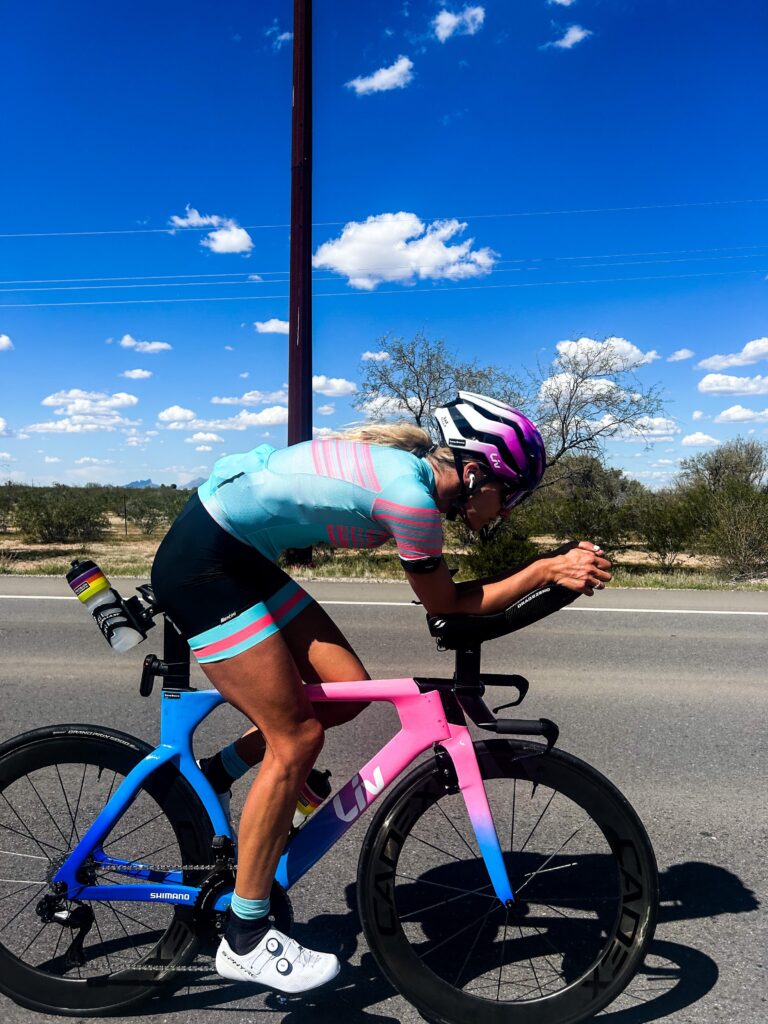
Pros don’t suffer less. They suffer faster
When you watch pro triathletes race, it’s natural to think that it must be easier for them. I mean, they make it look so smooth and effortless. They’re running at paces we can only dream of, and they look like they’re barely breaking a sweat.
But that’s not reality.
My husband likes to say that elite athletes suffer as much as we do. They just suffer faster.
My 7:30 minute mile might be Emma’s 5:30 minute mile or your 9:30 minute mile. Pain and pace are relative. Don’t make the mistake of thinking that just because someone runs faster, or slower, than you that it’s any easier for them.
Just like age-groupers, pros have challenges they have to overcome. For example, Emma struggles in humidity.
“Having a high sweat rate, low blood pressure, blood volume, and low heart rate, I’ve always struggled in humidity,” Emma explains. “I’ve not been able to finish in Kona, Durban, Phuket, China, and Miami. Two of the eight PTO races are humid, and I thought Miami would be more forgiving than Singapore.”
I relate to Emma on this point, because I have a high sweat rate and suffer mightily at humid races too. Because the moisture in the air doesn’t allow the sweat to evaporate, my body can’t cool itself off. As a result, my breathing and heart rate go through the roof, and I have to slow down or risk overheating.
“After some successful training in Durban, and some new measures put in place, I really wanted to see if I could finish a race in humidity and be a more robust, versatile athlete,” Emma says. “When faced with a challenge or something you aren’t good at, you always want to work at it and figure it out. Racing is the only true test of your work success.”
Sadly, despite all the prep work, Miami didn’t go as planned. Facing that type of disappointment and frustration at the first race of the season had to be tough. She felt like she’d let her coach, friends, and family down. The guilt was real for Emma, and it’s important for age-groupers to know that, because we feel the same things too.
Sometimes, I’ll be in the middle of a race wondering what my coach, husband, or friends are going to think of my performance. It’s not that I worry about judgement, because those close to us don’t do that. It’s more a feeling of disappointment about personal expectations not being met. Our loved ones know just how hard we work to achieve our goals, so they’re equally invested in our success.

The things you don’t plan for
Expecting the unexpected is just part of competing in triathlon. It’s kind of like life, come to think of it.
Just when you think you’ve got everything under control, and have prepared for every possible scenario, that’s when life laughs and says- Watch this!
After Miami, Emma headed to Tucson for a block of training before 70.3 Oceanside. Training was going really well, and she had a new bike position she wanted to test out, so she focused on long, hard efforts up and down a flat road.
That final Saturday, just a week before the race, Emma was doing her last brick session. She was in her aerobars pushing hard, when she must have hit something sharp in the road. Her front tire blew out and she went over her handlebars.
“The first day after the crash, I felt pretty sore but also super fortunate that nothing was broken,” she says. “My coach set me a day of rest, and I went for a walk to get fresh air and loosen the body.”
“I was determined to race, because we’d been away from home for six weeks. I wanted to be able to return home knowing the trip was worthwhile, so I put a lot of pressure on myself to get everything right that week and listened to everything Tim [my coach] said.”
Triathletes like to be in control. But what happens when life strays from the carefully crafted script you’ve written? Resilient athletes are those who can meet challenges, make adjustments, and move forward.
“From Miami, I knew about all the things we’d prepared for feeling and not going well on the run. There were plans we’d put in place to make me feel safe, but we’d never planned for things to go wrong on the bike,” Emma says. “That taught me you have to be in the moment. Prepare for everything you can, but for the things that come up, you have to deal with them in the here and now.”
Having a mental cue or race mantra you can draw on when things get tough is a great strategy. At 70.3 Oceanside, Emma knew the swim was going to be the most painful, so she came up with a mantra to help her push through.
“I had this saying in my head, ‘Go through hell and keep going.’ I thought, as soon as that pain hits, it’s not going to get any worse, so you just have to embrace, endure it, and push on through,” she says.
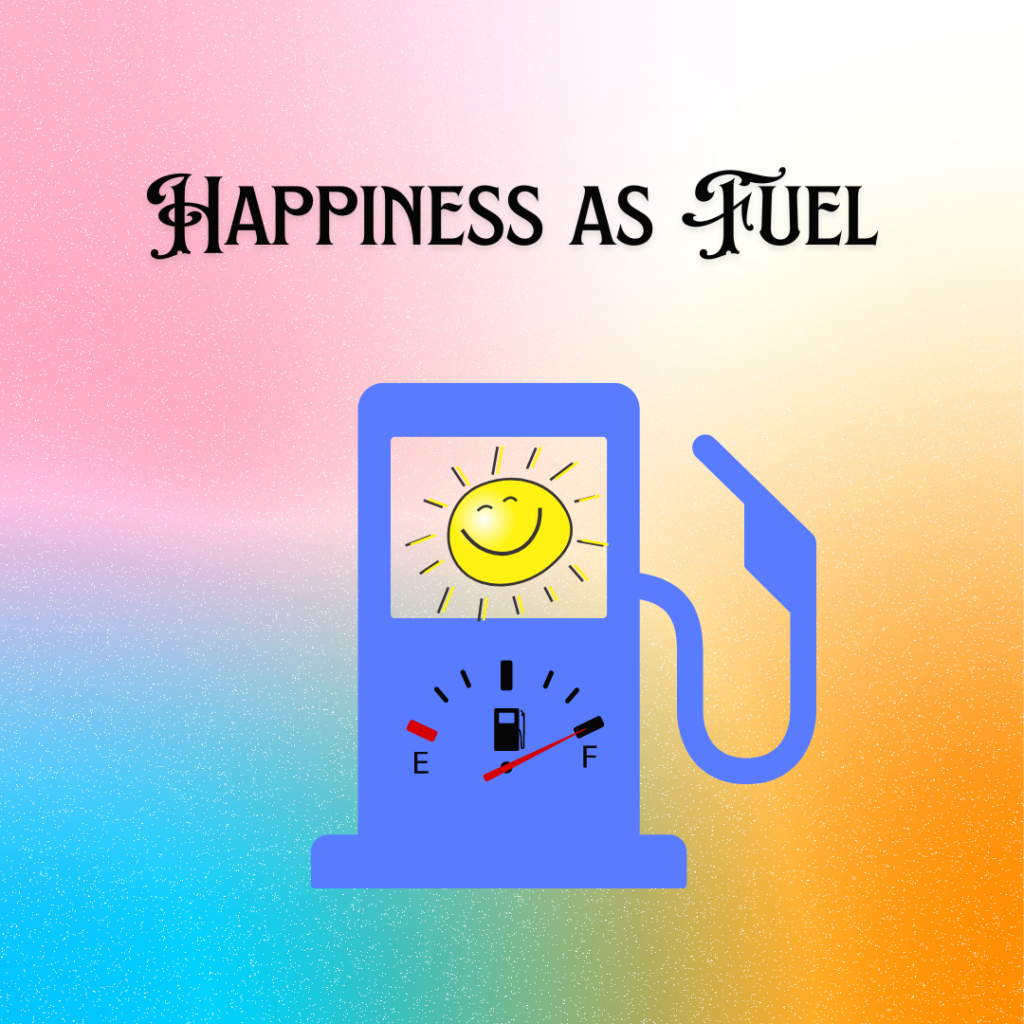
Using happiness as race fuel
Sometimes, I have to laugh a little when I see marketing teams hype up race rivalries. Because we can’t just watch these incredible athletes perform. There’s got to be some intense storyline, complete with a dramatic voiceover that creates the sense that an athlete is exacting revenge, or engaged in an epic battle, ect.
And I get it. It’s good marketing.
Just recognize that it’s not real life. And least not for everyone.
While Emma is a fierce competitor, her strength comes from happiness. “Some athletes need to be fired up,” she says. “If they get angry, they race well. But for me, it’s all about being happy.”
“Sometimes, I think about the people I love, the people who back me, my dogs, or our run project,” she says. “I think about all the good things in life and how grateful I am to be able to do what I love as a living. It gets me into that happy place where I push and perform the best.”

Self-confidence doesn’t come from not failing
Gaining self-confidence sometimes feels like the search for the Holy Grail. It’s this elusive thing that we know would be incredible to possess, but we’re not quite sure how to go about finding it.
Where does self-confidence come from? Are people born with it? If you aren’t, can you create it? How?
“I think my self-confidence as an athlete comes from telling myself to ‘always have the balls to try,’” Emma says.
Simply being willing to give it a shot is sometimes all it takes. That doesn’t mean you won’t fail, because you might. But it’s less about the failure and more about how you respond and keep trying. In that sense, can you consider it a failure at all? Maybe it’s just a step back to give you more of a run up to have a bigger leap forward.
“Sometimes, I’ve failed horribly, but I always think about being able to learn and move forward from those failings,” Emma says. “I keep trying to do things (that I have no evidence to show I can get right) but I want to push my body to deeper, darker places to see how strong I can be and what can be overcome. I’m not deterred if it isn’t achieved the first time.”
Triathlon is a solo sport, but that doesn’t mean we do it alone. There’s an entire village that helps us get to the start line: our family and friends, maybe a coach, probably a doctor, bike fitter, nutritionist, ect.
Self-confidence can also come from knowing that the people closest to you will still feel the same, regardless of race outcome.
“It comes also from the safety net of love from my husband, family, and friends. No matter what I fail at, to them I’m still Emma, not the athlete, but a person who will fall at times. It doesn’t change anything in my circle, and for that I’m truly grateful!”
